343 start with G start with G
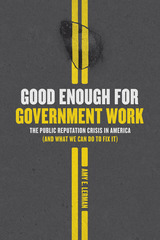
With Good Enough for Government Work, Lerman uses surveys, experiments, and public opinion data to argue persuasively that the reputation of government is itself an impediment to government’s ability to achieve the common good. In addition to improving its efficiency and effectiveness, government therefore has an equally critical task: countering the belief that the public sector is mired in incompetence. Lerman takes readers through the main challenges. Negative perceptions are highly resistant to change, she shows, because we tend to perceive the world in a way that confirms our negative stereotypes of government—even in the face of new information. Those who hold particularly negative perceptions also begin to “opt out” in favor of private alternatives, such as sending their children to private schools, living in gated communities, and refusing to participate in public health insurance programs. When sufficient numbers of people opt out of public services, the result can be a decline in the objective quality of public provision. In this way, citizens’ beliefs about government can quickly become a self-fulfilling prophecy, with consequences for all. Lerman concludes with practical solutions for how the government might improve its reputation and roll back current efforts to eliminate or privatize even some of the most critical public services.

Border fixity—the proscription of foreign conquest and the annexation of homeland territory—has, since World War II, become a powerful norm in world politics. This development has been said to increase stability and peace in international relations. Yet, in a world in which it is unacceptable to challenge international borders by force, sociopolitically weak states remain a significant source of widespread conflict, war, and instability.
In this book, Boaz Atzili argues that the process of state building has long been influenced by external territorial pressures and competition, with the absence of border fixity contributing to the evolution of strong states—and its presence to the survival of weak ones. What results from this norm, he argues, are conditions that make internal conflict and the spillover of interstate war more likely. Using a comparison of historical and contemporary case studies, Atzili sheds light on the relationship between state weakness and conflict. His argument that under some circumstances an international norm that was established to preserve the peace may actually create conditions that are ripe for war is sure to generate debate and shed light on the dynamics of continuing conflict in the twenty-first century.
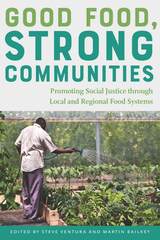
The approach begins by laying out the basic principles of food security and food justice in light of the diversity of food system practices and innovations in America’s cities. The contributing authors address land access for urban agriculture, debates over city farming, new possibilities in food processing, and the marketing of healthy food. They put these basic elements—land, production, processing, and marketing—in the context of municipal policy, education, and food justice and sovereignty, particularly for people of color. While the path of a food product from its producer to its consumer may seem straightforward on the surface, the apparent simplicity hides the complex logistical—and value-laden—factors that create and maintain a food system. This book helps readers understand how a food system functions and how individual and community initiatives can lessen the problems associated with an industrialized food system.

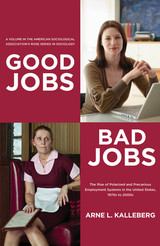

No modern president has had as much influence on American national politics as Franklin D. Roosevelt. During FDR’s administration, power shifted from states and localities to the federal government; within the federal government it shifted from Congress to the president; and internationally, it moved from Europe to the United States. All of these changes required significant effort on the part of the president, who triumphed over fierce opposition and succeeded in remaking the American political system in ways that continue to shape our politics today. Using the metaphor of the good neighbor, Mary E. Stuckey examines the persuasive work that took place to authorize these changes. Through the metaphor, FDR’s administration can be better understood: his emphasis on communal values; the importance of national mobilization in domestic as well as foreign affairs in defense of those values; his use of what he considered a particularly democratic approach to public communication; his treatment of friends and his delineation of enemies; and finally, the ways in which he used this rhetoric to broaden his neighborhood from the limits of the United States to encompass the entire world, laying the groundwork for American ideological dominance in the post–World War II era.

In The Good Project, Monika Krause dives into the intricacies of the decision-making process at NGOs and uncovers a basic truth: It may be the case that relief agencies try to help people but, in practical terms, the main focus of their work is to produce projects. Agencies sell projects to key institutional donors, and in the process the project and its beneficiaries become commodities. In an effort to guarantee a successful project, organizations are incentivized to help those who are easy to help, while those who are hardest to help often receive no assistance at all. The poorest of the world are made to compete against each other to become projects—and in exchange they offer legitimacy to aid agencies and donor governments. Sure to be controversial, The Good Project offers a provocative new perspective on how NGOs succeed and fail on a local and global level.
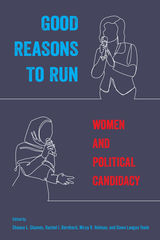
After the 2016 U.S. Presidential election, a large cohort of women emerged to run for office. Their efforts changed the landscape of candidates and representation. However, women are still far less likely than men to seek elective office, and face biases and obstacles in campaigns. (Women running for Congress make twice as many phone calls as men to raise the same contributions.)
The editors and contributors to Good Reasons to Run, a mix of scholars and practitioners, examine the reasons why women run—and do not run—for political office. They focus on the opportunities, policies, and structures that promote women’s candidacies. How do nonprofits help recruit and finance women as candidates? And what role does money play in women’s campaigns?
The essays in Good Reasons to Run ask not just who wants to run, but how to activate and encourage such ambition among a larger population of potential female candidates while also increasing the diversity of women running for office.

Which American presidents have been good? Which have been bad? Experts on the presidency have never been able to agree on their assessments. Bruce Kuklick suggests that historians and political scientists have approached the problem of defining successful leadership without adequately considering the essential factor. Instead of trying to evaluate which presidents set consistent and worthy policies and brought them to fruition, Kuklick asks us to pay more attention to how the American people feel about their presidents. The citizenry and its emotional responses are sued as the measure of a successful president, rather than the ostensibly rational appraisals of scholars.
Applying this measure to the presidents from the Depression to Watergate, Kuklick begins by tracing the way in which Franklin Roosevelt established the parameters of the inspirational presidency and how his success shaped the study of political history. He then explores the triumphs of Eisenhower and Kennedy and contrasts these triumphs too the failures of Hoover, Truman, Johnson, and Nixon. The ability of leaders to win the respect and admiration of the citizenry is, for Kuklick, the crucial touchstone by which the success of a president is judged.
To highlight this position that is not useful for historians to justify the merits or failures of a president by pointing out what he would have done had he lived longer or in a different era, Kiklick includes and entertaining and enlightening fable, an imaginary view of historical events: Nixon is elected in 1960, giving a youthful tone to the White House until his assassination in 1967; Kennedy is elected in 1968 but resigns after he is accused of misconduct. The fable demonstrates that the specific events are less important than a president’s ability to evoke a positive emotional response from the citizenry. The Good Ruler analyzes our recent political history without partisan bias and examines the basic premises of American democratic politics.
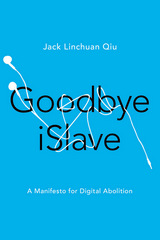
Focusing on the alliance between Apple and the notorious Taiwanese manufacturer Foxconn, Jack Linchuan Qiu examines how corporations and governments everywhere collude to build systems of domination, exploitation, and alienation. His interviews, news analysis, and first-hand observation show the circumstances faced by Foxconn workers--circumstances with vivid parallels in the Atlantic slave trade. Ironically, the fanatic consumption of digital media also creates compulsive free labor that constitutes a form of bondage for the user. Arguing as a digital abolitionist, Qiu draws inspiration from transborder activist groups and incidents of grassroots resistance to make a passionate plea aimed at uniting--and liberating--the forgotten workers who make our twenty-first-century lives possible.
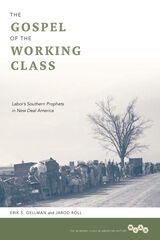
In this exceptional dual biography and cultural history, Erik S. Gellman and Jarod Roll trace the influence of two southern activist preachers, one black and one white, who used their ministry to organize the working class in the 1930s and 1940s across lines of gender, race, and geography. Owen Whitfield and Claude Williams, along with their wives Zella Whitfield and Joyce Williams, drew on their bedrock religious beliefs to stir ordinary men and women to demand social and economic justice in the eras of the Great Depression, New Deal, and Second World War.

By using gossip as a lens to examine profound issues of state security and institutional power, Elias thoroughly transforms our understanding of the development of modern American political culture.

This is an auto-narrated audiobook edition of this book.
J. Edgar Hoover, Joseph McCarthy, and Roy Cohn were titanic figures in midcentury America, wielding national power in government and the legal system through intimidation and insinuation. Hoover’s FBI thrived on secrecy, threats, and illegal surveillance, while McCarthy and Cohn will forever be associated with the infamous anticommunist smear campaign of the early 1950s, which culminated in McCarthy’s public disgrace during televised Senate hearings. In Gossip Men, Christopher M. Elias takes a probing look at these tarnished figures to reveal a host of startling new connections among gender, sexuality, and national security in twentieth-century American politics. Elias illustrates how these three men solidified their power through the skillful use of deliberately misleading techniques like implication, hyperbole, and photographic manipulation. Just as provocatively, he shows that the American people of the 1950s were particularly primed to accept these coded threats because they were already familiar with such tactics from widely popular gossip magazines.
By using gossip as a lens to examine profound issues of state security and institutional power, Elias thoroughly transforms our understanding of the development of modern American political culture.
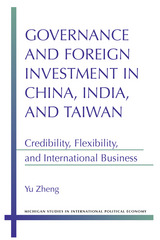
Yu Zheng challenges the idea that democracy is the prerequisite for developing countries to attract foreign direct investment (FDI) and promote economic growth. He examines the relationship between political institutions and FDI through the use of cross-national analysis and case studies of three rapidly growing Asian economies with a focus on the role of microinstitutional “special economic zones” (SEZ).
China’s authoritarian system allows for bold, radical economic reform, but China has attracted FDI largely because of its increasingly credible investment environment as well as its central and local governments’ efforts to overcome constraints on investment. India’s democratic institutions provide more political assurance to foreign investors, but its market became conducive to FDI only when the government adopted more flexible investment policies. Taiwan’s democratic transition shifted its balance of policy credibility and flexibility, which was essential for the nation’s economic takeoff and sustained growth.
Zheng concludes that a more accurate understanding of the relationship between political institutions and FDI comes from careful analysis of institutional arrangements that entail a trade-off between credibility and flexibility of governance.

Drawing on recent advances in the social sciences, this volume shows how rigorous, theory-based empirical research can help improve the management of public policies and programs—and how better governance can lead to better performance.
These original essays demonstrate how better data and improved statistical techniques have allowed researchers to construct more complex models of governance processes and thereby assess the effects of many variables on policy and program outcomes. They present useful research results that illuminate such issues as automatic grade advancement in public schools, management of federally-funded job-training programs, reducing welfare caseloads, and management of welfare-to-work programs.
Illustrating a range of theoretical and methodological possibilities, this book shows how more sophisticated research in public management can help improve government performance.
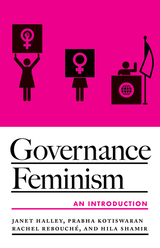
Describing and assessing feminist inroads into the state
Feminists walk the halls of power. Governance Feminism: An Introduction shows how some feminists and feminist ideas—but by no means all—have entered into state and state-like power in recent years. Being a feminist can qualify you for a job in the United Nations, the World Bank, the International Criminal Court, the local prosecutor’s office, or the child welfare bureaucracy. Feminists have built institutions and participate in governance.
The authors argue that governance feminism is institutionally diverse and globally distributed. It emerges from grassroots activism as well as statutes and treaties, as crime control and as immanent bureaucracy. Conflicts among feminists—global North and South; left, center, and right—emerge as struggles over governance. This volume collects examples from the United States, Israel, India, and from transnational human rights law.
Governance feminism poses new challenges for feminists: How shall we assess our successes and failures? What responsibility do we shoulder for the outcomes of our work? For the compromises and strange bedfellows we took on along the way?
Can feminism foster a critique of its own successes? This volume offers a pathway to critical engagement with these pressing and significant questions.
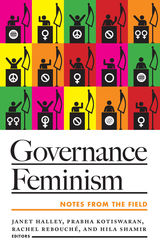
An interdisciplinary, multifaceted look at feminist engagements with governance across the global North and global South
Governance Feminism: Notes from the Field brings together nineteen chapters from leading feminist scholars and activists to critically describe and assess contemporary feminist engagements with state and state-like power. Gathering examples from North America, South America, Europe, Asia, and the Middle East, it complements and expands on the companion volume Governance Feminism: An Introduction. Its chapters argue that governance feminism (GF) is institutionally diverse and globally distributed—emerging from traditional sites of state power as well as from various forms of governance and operating at the grassroots level, in the private sector, in civil society, and in international relations.
The book begins by confronting the key role that crime and punishment play in GFeminist projects. Here, contributors explore the ideological and political conditions under which this branch of GF became so robust and rethink the carceral turn. Other chapters speak to another face of GFeminism: feminists finding, in mundane and seemingly unspectacular bureaucratic tools, leverage to bring about change in policy and governance practices. Several contributions highlight the political, strategic, and ethical challenges that feminists and LGBT activists must negotiate to play on the governmental field. The book concludes with a focus on feminist interventions in postcolonial legal and political orders, looking at new policy spaces opened up by conflict, postconflict, and occupation.
Providing a clear, cross-cutting, critical lens through which to map developments in feminist governance around the world, Governance Feminism: Notes from the Field makes sense of the costs and benefits of current feminist realities to reimagine feminist futures.
Contributors: Libby Adler, Northeastern U; Aziza Ahmed, Northeastern U; Elizabeth Bernstein, Barnard College; Amy J. Cohen, Ohio State U; Karen Engle, U of Texas at Austin; Jacob Gersen, Harvard U; Leigh Goodmark, U of Maryland; Aeyal Gross, Tel Aviv U; Aya Gruber, U of Colorado, Boulder; Janet Halley, Harvard U; Rema Hammami, Birzeit U, Palestine; Vanja Hamzić, U of London; Isabel Cristina Jaramillo-Sierra; Prabha Kotiswaran, King’s College London; Maleiha Malik, King’s College London; Vasuki Nesiah, New York U; Dianne Otto, Melbourne Law School; Helen Reece; Darren Rosenblum, Pace U; Jeannie Suk Gersen, Harvard U; Mariana Valverde, U of Toronto.

With the rush of calamitous events in recent years—the September 11 terror attacks, the Iraq imbroglio, and hurricanes Katrina and Rita—Americans feel themselves to be living in dark times. Trust in one another and in the government is at low ebb. People in public service face profound challenges to the meaning and efficacy of their work. Where can a public servant turn for a public philosophy to sustain practice?
Inspired by Hannah Arendt and several other philosophers, Governance in Dark Times is the first book to explore the philosophical and value underpinnings needed to guide public servants in these times. Featuring down-to-earth discussions of such issues as terrorism, torture, and homeland security, it suggests ways for people in government to think more deeply, judge more wisely, and act more meaningfully. Camilla Stivers argues that the most urgent requirement in dark times is re-kindling what Arendt called "the light of the public," and offers practical steps for public servants to create spaces for citizen dialogue and engagement in public life. Ideas like "governance of the common ground" and "public service as social hope" will spark discussion and encourage renewed dedication to the work of governing.
Grounded in the author's more than thirty years of teaching and administrative practice, Governance in Dark Times urges public servants in clear, jargon-free prose to reflect, to understand the world we live in, and to act responsibly, both individually and with fellow citizens.


From Austria to New Zealand, coalition governments often pave the road to foreign policy. In Western Europe, nearly 90 percent of postwar governments include two or more political parties. Israel, the Middle East’s only consolidated democracy according to many, has never experienced single-party rule in its history. Even the United Kingdom, known for its long streak of single-party rule, now navigates multiparty cabinets. Coalitions are everywhere, but we still have little understanding of how they act in foreign affairs. History shows that coalitions can sometime engage in powerful international commitments such as participating in military operations, but at other times, they postpone their decisions, water down their policy positions, or promise to do less than they otherwise would. What explains these differences in behavior?
Governing Abroad unpacks the little-known world of coalition governments to find out. Oktay argues that the specific constellation of parties in government explains why some coalitions can make more assertive foreign policy decisions than others. Building on the rich literature in political science on coalitions, legislatures, and voting behavior, the book weaves together sophisticated statistical analyses of foreign policy events across thirty European countries alongside in-depth case studies from Denmark, the Netherlands, and Finland. It brings political parties back into the study of foreign policy, demonstrating that the size of the coalition, the ideological proximity of the governing parties, and their relationship with the parliamentary opposition together influence the government’s ability to act in the international arena. This book challenges our existing perceptions about the constraints and weaknesses of coalition governments. It sheds new light on the conditions that allow them to act decisively abroad.
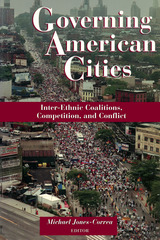
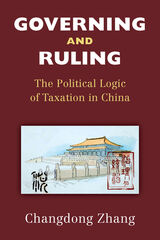
Rapid social economic changes, the transition from a planned economy to a market economy, or even economic liberalization can lead to political instability and the collapse of authoritarian regimes. Despite experiencing all of these unprecedented changes in the past forty years, China under the Chinese Communist Party’s leadership has so far successfully transformed and improved both its governance capacity and its ruling capacity. Governing and Ruling: The Political Logic of Taxation in China addresses this regime resilience puzzle by examining the political logic of its taxation system, especially the ways in which taxation helps China handle three governance problems: maneuvering social control, improving agent discipline, and eliciting cooperation. Changdong Zhang argues that a taxation system plays an important role in sustaining authoritarian rule, in China and elsewhere, by combining co-optation and repression functions. The book collects valuable firsthand and secondhand data; studies China’s taxation system, intergovernmental fiscal relationships, composition of fiscal revenue sources, and tax administration; and discusses how each dimension influences the three governance problems.

"Goss and Morse provide an outstandingly sound economic understanding of the function and place of casinos in American society, including essential heretofore unavailable grounding in the legal issues that the book accomplishes remarkably effectively. Moreover, this wealth of economic and legal information is transmitted in an engaging and readable manner. Scholarly, thoughtfully collected and authoritative, the book is of interest to any learner of the gambling industry, including students, civic activists, legislators, and scholars."
— Earl Grinols, Baylor University
"In this book, Morse and Goss make important contributions to our understanding of the negative outcomes of the expansion of gambling in America."
— Jon Bruning, Nebraska Attorney General
Edward A. Morse is Professor of Law and holder of the McGrath North Mullin & Kratz Endowed Chair in Business Law at Creighton University School of Law. Ernest P. Goss is Professor of Economics and MacAllister Chair at Creighton University and was a 2004 scholar-in-residence with the Congressional Budget Office.

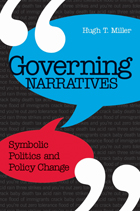
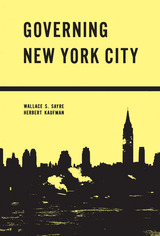
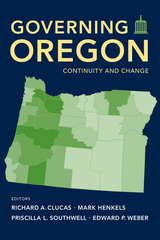
As the twenty-first century began, this political dynamic began to shift. Partisan conflict in the capitol grew less rancorous, legislative gridlock eased, and ballot initiatives lost their central role in defining Oregon politics. Less visible changes reshaped issues from agricultural policy to tribal government. This shifting dynamic coincided with significant transformations in Oregon’s economy and cultural life.
The state’s economy sustained severe blows twice in the early 2000s, but by 2014, Oregon boasted one of the fastest-growing economies in the nation. Along with economic expansion, Oregon’s population grew in both size and diversity. Despite these powerful forces of change, other aspects of Oregon political life remained entrenched, including the deep urban-rural divide and the state’s problematic fiscal system.
With contributions from 27 leading experts and political insiders, Governing Oregon: Continuity and Change offers insight into the people, political practices, governing institutions, and public policies of Oregon. It will be of tremendous value to political scientists, public servants, and engaged citizens alike.
Contributors:
Warda Ajaz is a PhD candidate in the School of Public Policy at Oregon State University.
Jeannine Beatrice is Chief of Staff with the Oregon Department of Human Services (DHS).
David Bernell is an Associate Professor of Political Science in the School of Public Policy at Oregon State University.
Joe Bowersox is the Dempsey Endowed Chair of Environmental Policy and Politics in the Department of Environmental and Earth Science at Willamette University.
Alexandra Buylova is a PhD candidate in the School of Public Policy at Oregon State University.
Paul De Muniz retired as Chief Justice of the Oregon Supreme Court in 2012 after serving for twelve years on the court. De Muniz currently teaches at Willamette University College of Law as a Distinguished Jurist in Residence.
Mark Edwards is Professor of Sociology in the School of Public Policy at Oregon State University.
Leanne Giordono is a PhD candidate in the School of Public Policy at Oregon State University and a National Science Foundation Graduate Research Fellow.
Daniel Gray is a Master of Public Policy (MPP) student in the School of Public Policy at Oregon State University.
Sajjad Haider is a PhD candidate at the School of Management, Lanzhou University (China), and a visiting research scholar at the Mark O. Hatfield School of Government, Portland State University.
Jordan Hensley earned a Master of Public Policy (MPP) degree from the School of Public Policy at Oregon State University.
Allison L. Hurst is an Associate Professor of Sociology in the School of Public Policy at Oregon State University.
Abdullah Husain is a PhD candidate in Environmental Sciences at Oregon State University.
Phil Keisling is Director of the Center for Public Service at Portland State University’s Mark O. Hatfield School of Government. He was Oregon Secretary of State from 1991–1999 and a Member of the Oregon House of Representatives from 1989–1991.
Chris Koski is Associate Professor of Environmental Studies and Chair of the Political Science Department at Reed College.
Justin Martin owns and operates, Perseverance Strategies, Inc., a government relations and public affairs firm.
Melissa Buis Michaux is Associate Professor of Politics at Willamette University.
Douglas Morgan is Professor Emeritus of Public Administration and Director of the Executive MPA Program in the Hatfield School of Government at Portland State University.
Sanne A. M. Rijkhoff is a former adjunct assistant professor of political science at Portland State University. She is currently an Eyes High Postdoctoral Associate at the University of Calgary.
Ethan Seltzer is an Emeritus Professor in the Toulan School of Urban Studies and Planning at Portland State University.
Brent S. Steel is Professor and the Director of the Graduate Program in the School of Public Policy at Oregon State University.
Casey L. Taylor is a Postdoctoral Research Associate in the Department of Political Science at Idaho State University.
Rebecca Warner is Professor of Sociology in the School of Public Policy at Oregon State University.


Beginning with a discussion of the political, economic, and cultural development of Europe from a historical perspective, the focus of the book shifts to an examination of the changing forms of European democracy and the move from public ownership and planning to privatization and deregulated competition. Further essays analyze the challenge to national party systems and electoral performance from emerging social movements and organized interest groups. Political and bureaucratic structures are also examined as is the new European constitutionalism reflected in the increasingly significant role of the judiciary. Lastly, attention is turned to several major themes in European politics: the changing foundations of foreign and security policy, the function of industrial champion firms, and the retreat from the welfare state. Primarily comparative in its scope, Governing the New Europe does devote particular attention to specific major states as well as to the importance of the European Union to the political life of member and non-member countries.
Neither exaggerating the common features of the patterns that have emerged in contemporary Europe nor capitulating to the complexity of enduring differences and instabilities between states, Governing the New Europe will become one of the standard texts in its field.
Contributors. Jack Hayward, Jolyon Howorth, Herbert Kitschelt, Marie Lavigne, Tom Mackie, Michael Mezey, Edward C. Page, Richard Parry, Richard Rose, Anthony Smith, Alec Stone

Take four emblematic American scenes: the Hall of Biodiversity at the American Museum of Natural History in New York; Disney’s Animal Kingdom theme park in Orlando; an ecotour of Yellowstone and Grand Teton National Parks; the film An Inconvenient Truth. Other than expressing a common interest in the environment, they seem quite dissimilar.
And yet, as Governing the Wild makes clear, these sites are all manifestations of green governmentality, each seeking to define and regulate our understanding, experience, and treatment of nature. Stephanie Rutherford shows how the museum presents a scientized assessment of global nature under threat; the Animal Kingdom demonstrates that a corporation can successfully organize a biopolitical project; the ecotour, operating as a school for a natural aesthetic sensibility, provides a visual grammar of pristine national nature; and the film offers a toehold on a moral way of encountering nature. But one very powerful force unites the disparate “truths” of nature produced through these sites, and that, Rutherford tells us, is their debt to nature’s commodification.
Rutherford’s analysis reveals how each site integrates nature, power, and profit to make the buying and selling of nature critical to our understanding and rescuing of it. The combination, she argues, renders other ways of encountering nature—particularly more radically environmental ways—unthinkable.
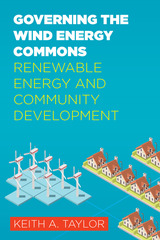
Wind energy is often framed as a factor in rural economic development, an element of the emerging “green economy” destined to upset the dominant greenhouse- gas-emitting energy industry and deliver conscious capitalism to host communities. The bulk of wind energy firms, however, are subsidiaries of the same fossil fuel companies that wrought havoc in shale-gas and coal-mining towns from rural Appalachia to the Great Plains. On its own, wind energy development does not automatically translate into community development.
In Governing the Wind Energy Commons, Keith Taylor asks whether revenue generated by wind power can be put to community well-being rather than corporate profit. He looks to the promising example of rural electric cooperatives, owned and governed by the 42 million Americans they serve, which generate $40 billion in annual revenue. Through case studies of a North Dakota wind energy cooperative and an investor-owned wind farm in Illinois, Taylor examines how regulatory and social forces are shaping this emerging energy sector. He draws on interviews with local residents to assess strategies for tipping the balance of power away from absentee-owned utilities.

Because the world has long seen Sweden as a pioneer of democratic socialism, the success or failure of social experiments there has had momentous impact on the development of similar programs elsewhere. Now, in this penetrating inquiry undertaken by one of Sweden's leading political scientists, the problems and practices of Swedish trade unions are fully revealed.
Leif Lewin is interested in finding answers to several central questions: How “democratic” are Sweden's unions? How are they governed? How have they avoided the institutional inequities that plague some American unions? What sacrifices have Swedish unions had to make in order to solve their problems?
Lewin has gone directly to the people concerned, receiving from some 3,000 union members and leaders the information that forms the basis of his study. But his book is more than an empirical analysis of trade union democracy. It is also a strikingly successful example for all social scientists who have struggled to apply a hypothetical model of “democracy” to the ambiguous, often turbulent world around them. Above all, Lewin shows how the democratic ideal of individual intellectual and moral enrichment can be approached through participation in collective decision making. Thoughtful and balanced, his book addresses many of the problems that are just now being faced by social planners, economists, and union organizers everywhere.
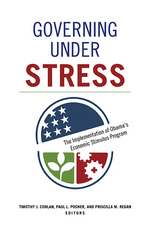
The underappreciated but surprisingly successful implementation of the American Recovery and Reinvestment Act (ARRA) helped rescue the economy during the Great Recession and represented one of the most important achievements of the Obama presidency. It tested all levels of government with urgent time frames and extensive accountability requirements. While ARRA passed most tests with comparatively little mismanagement or fraud, negative public and media perceptions of the initiative deprived the president of political credit.
Drawing on more than two hundred interviews and nationwide field research, Governing under Stress examines a range of ARRA stimulus programs to analyze the fraught politics, complex implementation, and impact of the legislation. Essays from public administration scholars use ARRA to study how to implement large federal programs in our modern era of indirect, networked governance. Throughout, the contributors present potent insights into the most pressing challenges facing public policy and management, and they uncover important lessons about policy instruments and networks, the effects of transparency and accountability, and the successes and failures of different types of government intervention.
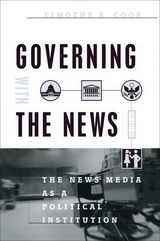
"Provocative and often wise. . . . Cook, who has a complex understanding of the relationship between governing and the news, provides a fascinating account of the origins of this complicity."—James Bennet, Washington Monthly
"[Governing with the News] addresses central issues of media impact and power in fresh, illuminating ways. . . . Cook mines a wealth of historical and organizational literature to assert that the news media are a distinct political institution in our democratic system."—Robert Schmuhl, Commonweal
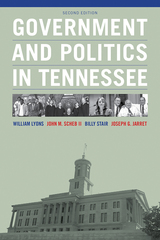
Most Americans are more aware of the workings of the federal government than of their own state governments. But these “laboratories of democracy” constitute perhaps the most creative components of the American political experiment.
This book serves as a guide for students of government and provides a historical context for understanding the forces at work in the state’s political system. Among the states, Tennessee’s unique blend of legislative and executive powers is, in some respects, far more a product of personality than political ideology. This second edition describes these often colorful leaders and the issues they grappled with, including education, health care, corrections, economic development, and other key factors. A full analysis of government institutions embodied in the legislative, executive, and judicial branches is supplemented by added attention to county government and public administration.
Fully up to date, this edition also provides key chapters on the media, political campaigns, and the rising dominance of the Republican Party in recent decades. In addition, it focuses on how a new generation of politicians—among them, Governor Bill Haslam, House Speaker Beth Harwell, and Knoxville Mayor Madeline Rogero—have emerged to carry on the legacy of state leadership.

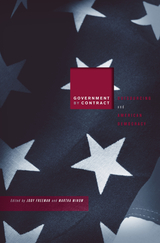
The dramatic growth of government over the course of the twentieth century since the New Deal prompts concern among libertarians and conservatives and also among those who worry about government’s costs, efficiency, and quality of service. These concerns, combined with rising confidence in private markets, motivate the widespread shift of federal and state government work to private organizations. This shift typically alters only who performs the work, not who pays or is ultimately responsible for it. “Government by contract” now includes military intelligence, environmental monitoring, prison management, and interrogation of terrorism suspects.
Outsourcing government work raises questions of accountability. What role should costs, quality, and democratic oversight play in contracting out government work? What tools do citizens and consumers need to evaluate the effectiveness of government contracts? How can the work be structured for optimal performance as well as compliance with public values?
Government by Contract explains the phenomenon and scope of government outsourcing and sets an agenda for future research attentive to workforce capacities as well as legal, economic, and political concerns.
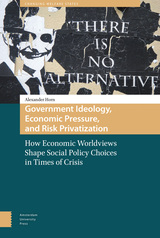
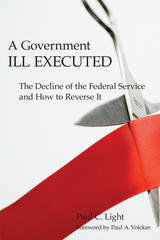
The federal government is having increasing difficulty faithfully executing the laws, which is what Alexander Hamilton called “the true test” of a good government. This book diagnoses the symptoms, explains their general causes, and proposes ways to improve the effectiveness of the federal government. Employing Hamilton’s seven measures of an energetic federal service, Paul Light shows how the government is wanting in each measure.
After assessing the federal report card, Light offers a comprehensive agenda for reform, including new laws limiting the number of political appointees, reducing the layers of government management, reducing the size of government as its Baby Boom employees retire, revitalizing the federal career, and reducing the heavy outsourcing of federal work. Although there are many ways to fix each of the seven problems with government, only a comprehensive agenda will bring the kind of reform needed to reverse the overall erosion of the capacity to faithfully execute all the laws.



Government of the Shadows analyses the concept of clandestine government. It explores how covert political activity and transnational organised crime are linked -- and how they ultimately work to the advantage of state and corporate power.
The book shows that legitimate government is now routinely accompanied by extra-governmental covert operations. Using a variety of case studies, from the mafia in Italy to programmes for food and reconstruction in Iraq, the contributors illustrate that para-political structures are not 'deviant', but central to the operation of global governments.
The creation of this truly parallel world-economy, the source of huge political and economic potential, entices states to undertake new forms of regulation, either through their own intelligence agencies, or through the more shadowy world of criminal cartels.

Democratic government is about making choices. Sometimes those choices involve the distribution of benefits. At other times they involve the imposition of some type of loss—a program cut, increased taxes, or new regulatory standards. Citizens will resist such impositions if they can, or will try to punish governments at election time. The dynamics of loss imposition are therefore a universal—if unpleasant—element of democratic governance. The Government Taketh Away examines the repercussions of unpopular government decisions in Canada and the United States, the two great democratic nations of North America.
Pal, Weaver, and their contributors compare the capacities of the U.S. presidential system and the Canadian Westminster system to impose different types of losses: symbolic losses (gun control and abortion), geographically concentrated losses (military base closings and nuclear waste disposal), geographically dispersed losses (cuts to pensions and to health care), and losses imposed on business (telecommunications deregulation and tobacco control). Theory holds that Westminster-style systems should, all things being equal, have a comparative advantage in loss imposition because they concentrate power and authority, though this can make it easier to pin blame on politicians too. The empirical findings of the cases in this book paint a more complex picture. Westminster systems do appear to have some robust abilities to impose losses, and US institutions provide more opportunities for loss-avoiders to resist government policy in some sectors. But in most sectors, outcomes in the two countries are strikingly similar.
The Government Taketh Away is essential for the scholar and students of public policy or comparative policy. It is also an important book for the average citizen who wants to know more about the complexities of living in a democratic society where the government can give-but how it can also, sometimes painfully, "taketh away."
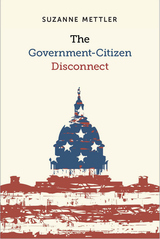
Drawing from original survey data which probed Americans’ experiences of 21 federal social policies -- such as food stamps, Social Security, Medicaid, and the home mortgage interest deduction -- Mettler shows that 96 percent of adults have received benefits from at least one of them, and that the average person has utilized five. Overall usage rates transcend social, economic, and political divisions, and most Americans report positive experiences of their policy experiences. However, the fact that they have benefited from these policies has little positive effect on people’s attitudes toward government. Mettler finds that shared identities and group affiliations, as well as ideological forces, are more powerful and consistent influences. In particular, those who oppose welfare tend to extrapolate their unfavorable views of it to government in general. Deep antipathy toward the government has emerged as the result of a conservative movement that has waged a war on social welfare policies for over forty years, even as economic inequality and benefit use have increased.
Mettler finds that voting patterns exacerbate the government-citizen disconnect, as those holding positive views of federal programs and supporting expanded benefits have lower rates of political participation than those holding more hostile views of the government. As a result, the loudest political voice belongs to those who have benefited from policies but who give government little credit for their economic well-being, seeing their success more as a matter of their own deservingness. This contributes to the election of politicians who advocate cutting federal social programs. According to Mettler, the government-citizen disconnect frays the bonds of representative government and democracy.
The Government-Citizen Disconnect illuminates a paradox that increasingly shapes American politics. Mettler's examination of hostility toward government at a time when most Americans will at some point rely on the social benefits it provides helps us better understand the roots of today's fractious political climate.
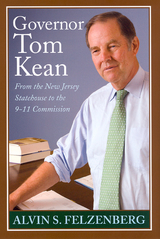
In this first political biography of one of the nation's most popular and successful governors, Alvin S. Felzenberg tells the story of a remarkable career that culminated in an unexpected and crucial contribution to the country-chairmanship of the 9/11 Commission. Felzenberg describes how, early in his political career, Kean worked to transform New Jersey's legislature in the aftermath of court rulings that mandated redistricting in accordance with the "one man, one vote" principle. He discusses Kean's efforts to relieve the urban crisis that followed in the wake of the 1967 Newark riots. He relates how Kean was able to use the New Jersey governorship-purportedly the strongest in the country-to transform a so-called "rust belt" state into a leader in education, environmental responsibility, and economic growth.
Kean's successes in these and other areas caused leaders outside New Jersey to follow in his path. Together with his fellow governors, Kean forged a national consensus on domestic policy between Democratic congresses and Republican presidents, in the process winning for himself a leadership role in his own party. Kean's story serves as an uncommon case of how a Republican loyal to the historic roots and principles of his party can not only win election in a "blue state" but effectively govern it.
Starting from the example the governor set on the state level, Felzenberg's account traces Kean's career to positions of trusted authority on the national stage. After several years of advising presidents, Kean was appointed chairman of the 9/11 Commission. In this role, he made the bipartisan, Congressionally mandated commission one of the most successful in American history.
Drawing on interviews with Kean as well as with state and national leaders, including former presidents Gerald Ford and Bill Clinton and former New York City mayor Ed Koch, Felzenberg not only provides a marvelous biography, but also offers a unique look at American politics during the last four decades of the twentieth century.
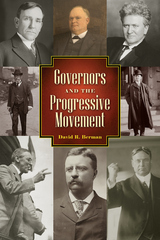
Governors and the Progressive Movement is the first comprehensive overview of the Progressive movement’s unfolding at the state level, covering every state in existence at the time through the words and actions of state governors. It explores the personalities, ideas, and activities of this period’s governors, including lesser-known but important ones who deserve far more attention than they have previously been given.
During this time of greedy corporations, political bosses, corrupt legislators, and conflict along racial, class, labor/management, urban/rural, and state/local lines, debates raged over the role of government and issues involving corporate power, racism, voting rights, and gender equality—issues that still characterize American politics. Author David R. Berman describes the different roles each governor played in the unfolding of reform around these concerns in their states. He details their diverse leadership qualities, governing styles, and accomplishments, as well as the sharp regional differences in their outlooks and performance, and finds that while they were often disposed toward reform, governors held differing views on issues—and how to resolve them.
Governors and the Progressive Movement examines a time of major changes in US history using relatively rare and unexplored collections of letters, newspaper articles, and government records written by and for minority group members, labor activists, and those on both the far right and far left. By analyzing the governors of the era, Berman presents an interesting perspective on the birth and implementation of controversial reforms that have acted as cornerstones for many current political issues. This book will be of interest to students and scholars of US history, political science, public policy, and administration.

In the tumultuous years following the Civil War, violence and lawlessness plagued the state of Texas, often overwhelming the ability of local law enforcement to maintain order. In response, Reconstruction-era governor Edmund J. Davis created a statewide police force that could be mobilized whenever and wherever local authorities were unable or unwilling to control lawlessness. During its three years (1870–1873) of existence, however, the Texas State Police was reviled as an arm of the Radical Republican party and widely condemned for being oppressive, arrogant, staffed with criminals and African Americans, and expensive to maintain, as well as for enforcing the new and unpopular laws that protected the rights of freed slaves.
Drawing extensively on the wealth of previously untouched records in the Texas State Archives, as well as other contemporary sources, Barry A. Crouch and Donaly E. Brice here offer the first major objective assessment of the Texas State Police and its role in maintaining law and order in Reconstruction Texas. Examining the activities of the force throughout its tenure and across the state, the authors find that the Texas State Police actually did much to solve the problem of violence in a largely lawless state. While acknowledging that much of the criticism the agency received was merited, the authors make a convincing case that the state police performed many of the same duties that the Texas Rangers later assumed and fulfilled the same need for a mobile, statewide law enforcement agency.
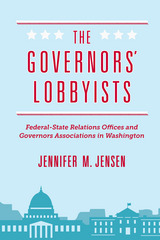
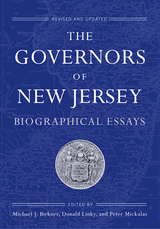
Rogues, aristocrats, and a future U.S. president. These and other governors are portrayed in this revised and updated edition of the classic reference work on the chief executives of New Jersey. Editors Michael J. Birkner, Donald Linky, and Peter Mickulas present new essays on the governors of the last three decades—Brendan T. Byrne, Thomas Kean, James Florio, Christine Todd Whitman, Donald DiFrancesco, James McGreevey, Richard Codey, and Jon Corzine. The essays included in the original edition are amended, edited, and corrected as necessary in light of new and relevant scholarship.
The authors of each governor’s life story represent a roster of such notable scholars as Larry Gerlach, Stanley Katz, Arthur Link, and Clement Price, as well as many other experts on New Jersey history and politics. As a result, this revised edition is a thorough and current reference work on the New Jersey governorship—one of the strongest in the nation.
Also of Interest:
New Jersey Politics and Government
The Suburbs Come of Age
Fourth Edition
Barbara G. Salmore with Stephen A. Salmore
978-0-8135-6139-4 paper $34.95
A volume in the Rivergate Regionals Collection
Me, Governor?
My Life in the Rough-and-Tumble World of New Jersey Politics
Richard J. Codey
978-0-8135-5045-9 cloth $24.95
The Life and Times of Richard J. Hughes
The Politics of Civility
John B. Wefing
978-0-8135-4641-4 cloth $32.50
Governor Tom Kean
From the New Jersey Statehouse to the 911 Commission
Alvin S. Felzenberg
978-0-8135-3799-3 cloth $29.95

In many countries, public sector institutions impose heavy burdens on economic life: heavy and arbitrary taxes retard investment, regulations enrich corrupt bureaucrats, state firms consume national wealth, and the most talented people turn to rent-seeking rather than productive activities. As a consequence of such predatory policies--described in this book as the grabbing hand of the state--entrepreneurship lingers and economies stagnate.
The authors of this collection of essays describe many of these pathologies of a grabbing hand government, and examine their consequences for growth. The essays share a common viewpoint that political control of economic life is central to the many government failures that we observe. Fortunately, a correct diagnosis suggests the cures, including the best strategies of fighting corruption, privatization of state firms, and institutional building in the former socialist economies. Depoliticization of economic life emerges as the crucial theme of the appropriate reforms. The book describes the experiences with the grabbing hand government and its reform in medieval Europe, developing countries, transition economies, as well as today's United States.
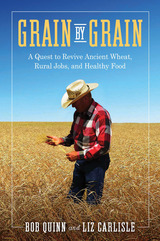
When Bob Quinn was a kid, a stranger at a county fair gave him a few kernels of an unusual grain. Little did he know, that grain would change his life. Years later, after finishing a PhD in plant biochemistry and returning to his family’s farm in Montana, Bob started experimenting with organic wheat. In the beginning, his concern wasn’t health or the environment; he just wanted to make a decent living and some chance encounters led him to organics.
But as demand for organics grew, so too did Bob’s experiments. He discovered that through time-tested practices like cover cropping and crop rotation, he could produce successful yields—without pesticides. Regenerative organic farming allowed him to grow fruits and vegetables in cold, dry Montana, providing a source of local produce to families in his hometown. He even started producing his own renewable energy. And he learned that the grain he first tasted at the fair was actually a type of ancient wheat, one that was proven to lower inflammation rather than worsening it, as modern wheat does.
Ultimately, Bob’s forays with organics turned into a multimillion dollar heirloom grain company, Kamut International. In Grain by Grain, Quinn and cowriter Liz Carlisle, author of Lentil Underground, show how his story can become the story of American agriculture. We don’t have to accept stagnating rural communities, degraded soil, or poor health. By following Bob’s example, we can grow a healthy future, grain by grain.
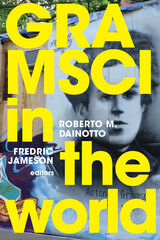
Contributors. Alberto Burgio, Cesare Casarino, Maria Elisa Cevasco, Kate Crehan, Roberto M. Dainotto, Michael Denning, Harry Harootunian, Fredric Jameson, R. A. Judy, Patrizia Manduchi, Andrea Scapolo, Peter D. Thomas, Catherine Walsh, Pu Wang, Cosimo Zene

Unlike previous revolutionary movements, Day argues, most contemporary radical social movements do not strive to take control of the state. Instead, they attempt to develop new forms of self-organisation that can run in parallel with---or as alternatives to---existing forms of social, political, and economic organization. This is to say that they follow a logic of affinity rather than one of hegemony.
This book draws together a variety of different strands in political theory to weave together an innovative new approach to politics today. Rigorous and wide-ranging, Day introduces and interrogates key concepts. From Hegel's concept of recognition, through theories of hegemony and affinity to Hardt and Negri's reflections on Empire, Day maps academia's theoretical and philosophical concerns onto today's politics of the street.
Ideal for all students of political theory, Day's fresh approach combines Marxist, Anarchist and Post-structuralist theory to shed new light on the politics and practice of contemporary social movements.
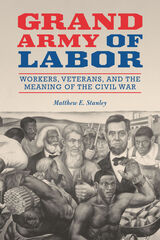
From the Gilded Age through the Progressive era, labor movements reinterpreted Abraham Lincoln as a liberator of working people while workers equated activism with their own service fighting for freedom during the war. Matthew E. Stanley explores the wide-ranging meanings and diverse imagery used by Civil War veterans within the sprawling radical politics of the time. As he shows, a rich world of rituals, songs, speeches, and newspapers emerged among the many strains of working class cultural politics within the labor movement. Yet tensions arose even among allies. Some people rooted Civil War commemoration in nationalism and reform, and in time, these conservative currents marginalized radical workers who tied their remembering to revolution, internationalism, and socialism.
An original consideration of meaning and memory, Grand Army of Labor reveals the complex ways workers drew on themes of emancipation and equality in the long battle for workers’ rights.

Through beautifully-told stories from around the world, Kevin Walker reveals the unintended consequences of our myopic focus on quantity over quality. A trip to a Costa Rica plantation shows how the Cavendish banana became the most common fruit in the world and also one of the most vulnerable to disease. Walker’s early career in agribusiness taught him how pressure to sell more and more fertilizer obscured what that growth did to waterways. His family farm illustrates how an unquestioning belief in “free markets” undercut opportunity in his hometown.
By the end of the journey, we not only understand how the drive to produce ever more food became hardwired into the American psyche, but why shifting our mindset is essential. It starts, Walker argues, with remembering that what we eat affects the wider world. If each of us decides that bigger isn’t always better, we can renegotiate the grand food bargain, one individual decision at a time.
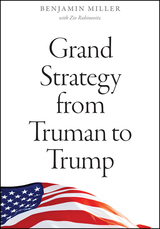
American foreign policy is the subject of extensive debate. Many look to domestic factors as the driving forces of bad policies. Benjamin Miller instead seeks to account for changes in US international strategy by developing a theory of grand strategy that captures the key security approaches available to US decision-makers in times of war and peace.
Grand Strategy from Truman to Trump makes a crucial contribution to our understanding of competing grand strategies that accounts for objectives and means of security policy. Miller puts forward a model that is widely applicable, based on empirical evidence from post-WWII to today, and shows that external factors—rather than internal concerns—are the most determinative.
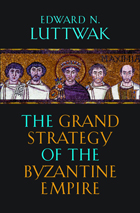
In this book, the distinguished writer Edward N. Luttwak presents the grand strategy of the eastern Roman empire we know as Byzantine, which lasted more than twice as long as the more familiar western Roman empire, eight hundred years by the shortest definition. This extraordinary endurance is all the more remarkable because the Byzantine empire was favored neither by geography nor by military preponderance. Yet it was the western empire that dissolved during the fifth century.
The Byzantine empire so greatly outlasted its western counterpart because its rulers were able to adapt strategically to diminished circumstances, by devising new ways of coping with successive enemies. It relied less on military strength and more on persuasion—to recruit allies, dissuade threatening neighbors, and manipulate potential enemies into attacking one another instead. Even when the Byzantines fought—which they often did with great skill—they were less inclined to destroy their enemies than to contain them, for they were aware that today’s enemies could be tomorrow’s allies. Born in the fifth century when the formidable threat of Attila’s Huns were deflected with a minimum of force, Byzantine strategy continued to be refined over the centuries, incidentally leaving for us several fascinating guidebooks to statecraft and war.
The Grand Strategy of the Byzantine Empire is a broad, interpretive account of Byzantine strategy, intelligence, and diplomacy over the course of eight centuries that will appeal to scholars, classicists, military history buffs, and professional soldiers.
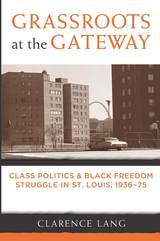
"This is a theoretically sophisticated and thoroughly documented historical case study of the movements for African American liberation in St. Louis. Through detailed analysis of black working class mobilization from the depression years to the advent of Black Power, award-winning historian Clarence Lang describes how the advances made in earlier decades were undermined by a black middle class agenda that focused on the narrow aims of black capitalists and politicians. The book is a major contribution to our understanding of the black working class insurgency that underpinned the civil rights and Black Power campaigns of the twentieth century."
---V. P. Franklin, University of California, Riverside
"A major work of scholarship that will transform historical understanding of the pivotal role that class politics played in both civil rights and Black Power activism in the United States. Clarence Lang's insightful, engagingly written, and well-researched study will prove indispensable to scholars and students of postwar American history."
---Peniel Joseph, Brandeis University
Breaking new ground in the field of Black Freedom Studies, Grassroots at the Gateway reveals how urban black working-class communities, cultures, and institutions propelled the major African American social movements in the period between the Great Depression and the end of the Great Society. Using the city of St. Louis in the border state of Missouri as a case study, author Clarence Lang undermines the notion that a unified "black community" engaged in the push for equality, justice, and respect. Instead, black social movements of the working class were distinct from---and at times in conflict with---those of the middle class. This richly researched book delves into African American oral histories, records of activist individuals and organizations, archives of the black advocacy press, and even the records of the St. Louis' economic power brokers whom local black freedom fighters challenged. Grassroots at the Gateway charts the development of this race-class divide, offering an uncommon reading of not only the civil rights movement but also the emergence and consolidation of a black working class.
Clarence Lang is Assistant Professor in African American Studies and History at the University of Illinois at Urbana-Champaign.
Photo courtesy Western Historical Manuscript Collection, University of Missouri, St. Louis
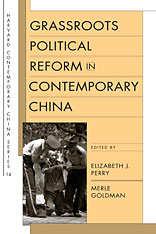
Observers often note the glaring contrast between China's stunning economic progress and stalled political reforms. Although sustained growth in GNP has not brought democratization at the national level, this does not mean that the Chinese political system has remained unchanged. At the grassroots level, a number of important reforms have been implemented in the last two decades.
This volume, written by scholars who have undertaken substantial fieldwork in China, explores a range of grassroots efforts--initiated by the state and society alike--intended to restrain arbitrary and corrupt official behavior and enhance the accountability of local authorities. Topics include village and township elections, fiscal reforms, legal aid, media supervision, informal associations, and popular protests. While the authors offer varying assessments of the larger significance of these developments, their case studies point to a more dynamic Chinese political system than is often acknowledged. When placed in historical context--as in the Introduction--we see that reforms in local governance are hardly a new feature of Chinese political statecraft and that the future of these experiments is anything but certain.
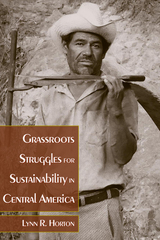
With a comparative, empirical approach, Horton also analyzes dominant practices linked to sustainable development - neoliberal reforms, project interventions, and environmental protection. She reveals how these practices support or undermine economic, cultural, and political opportunities for the rural and indigenous poor and impact these communities' advancement of their own visions of sustainability. Finally, the author explores processes of empowerment that enable communities to articulate and put into practice local visions of sustainability, which contribute toward broader social and structural transformations.
Grassroots Struggles for Sustainability in Central America will interest sociologists, anthropologists, and others who study the theory and practice of sustainable development.

The optimism that arrived at the end of the cold war and marked the turn of the Millennium was shattered by September 11. In the aftermath of that event it is not unwarranted pessimism that lines the pages of Grave New World, it is unavoidable reality. Terrorism is but one aspect of many other wider concerns for national and international security, and the contributors to this volume not only warn us, but reward us as well with the clarity of their views into—and possible solutions for—a difficult, complicated future. They speak convincingly of the numerous military and non-military challenges that create security problems—whether those are interstate, intrastate, or transnational—many of which are being dangerously overlooked in public policy debates.
The challenges and complexities might seem insurmountable but the first step in solving problems is recognizing that they exist. Grave New World provides an eye-opening assessment of the prospects for peace and security in the 21st century.
Michael E. Brown frames these issues in his Introduction, "Security Challenges in the 21st Century;" and in his summation, "Security Problems and Security Policy in a Grave New World."
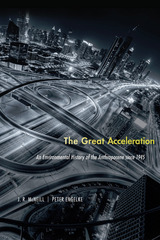
The Earth has entered a new age—the Anthropocene—in which humans are the most powerful influence on global ecology. Since the mid-twentieth century, the accelerating pace of energy use, greenhouse gas emissions, and population growth has thrust the planet into a massive uncontrolled experiment. The Great Acceleration explains its causes and consequences, highlighting the role of energy systems, as well as trends in climate change, urbanization, and environmentalism.
More than any other factor, human dependence on fossil fuels inaugurated the Anthropocene. Before 1700, people used little in the way of fossil fuels, but over the next two hundred years coal became the most important energy source. When oil entered the picture, coal and oil soon accounted for seventy-five percent of human energy use. This allowed far more economic activity and produced a higher standard of living than people had ever known—but it created far more ecological disruption.
We are now living in the Anthropocene. The period from 1945 to the present represents the most anomalous period in the history of humanity’s relationship with the biosphere. Three-quarters of the carbon dioxide humans have contributed to the atmosphere has accumulated since World War II ended, and the number of people on Earth has nearly tripled. So far, humans have dramatically altered the planet’s biogeochemical systems without consciously managing them. If we try to control these systems through geoengineering, we will inaugurate another stage of the Anthropocene. Where it might lead, no one can say for sure.

Based on one of the most ambitious studies in the history of social science, Robert J. Sampson’s Great American City presents the fruits of over a decade’s research to support an argument that we all feel and experience every day: life is decisively shaped by your neighborhood.
Engaging with the streets and neighborhoods of Chicago, Sampson, in this new edition, reflects on local and national changes that have transpired since his book’s initial publication, including a surge in gun violence and novel forms of segregation despite an increase in diversity. New research, much of it a continuation of the influential discoveries in Great American City, has followed, and here, Sampson reflects on its meaning and future directions. Sampson invites readers to see the status of the research initiative that serves as the foundation of the first edition—the Project on Human Development in Chicago Neighborhoods (PHDCN)—and outlines the various ways other scholars have continued his work. Both accessible and incisively thorough, Great American City is a must-read for anyone interested in cutting-edge urban sociology and the study of crime.

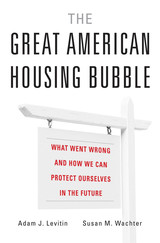
The definitive account of the housing bubble that caused the Great Recession—and earned Wall Street fantastic profits.
The American housing bubble of the 2000s caused the worst global financial crisis since the Great Depression. In this definitive account, Adam Levitin and Susan Wachter pinpoint its source: the shift in mortgage financing from securitization by Fannie Mae and Freddie Mac to “private-label securitization” by Wall Street banks. This change set off a race to the bottom in mortgage underwriting standards, as banks competed in laxity to gain market share.
The Great American Housing Bubble tells the story of the transformation of mortgage lending from a dysfunctional, local affair, featuring short-term, interest-only “bullet” loans, to a robust, national market based around the thirty-year fixed-rate mortgage, a uniquely American innovation that served as the foundation for the middle class.
Levitin and Wachter show how Fannie and Freddie’s market power kept risk in check until 2003, when mortgage financing shifted sharply to private-label securitization, as lenders looked for a way to sustain lending volume following an unprecedented refinancing wave. Private-label securitization brought a return of bullet loans, which had lower initial payments—enabling borrowers to borrow more—but much greater back-loaded risks. These loans produced a vast oversupply of underpriced mortgage finance that drove up home prices unsustainably. When the bubble burst, it set off a destructive downward spiral of home prices and foreclosures.
Levitin and Wachter propose a rebuild of the housing finance system that ensures the widespread availability of the thirty-year fixed-rate mortgage, while preventing underwriting competition and shifting risk away from the public to private investors.
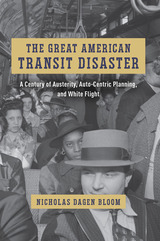
Many a scholar and policy analyst has lamented American dependence on cars and the corresponding lack of federal investment in public transportation throughout the latter decades of the twentieth century. But as Nicholas Dagen Bloom shows in The Great American Transit Disaster, our transit networks are so bad for a very simple reason: we wanted it this way.
Focusing on Baltimore, Atlanta, Chicago, Detroit, Boston, and San Francisco, Bloom provides overwhelming evidence that transit disinvestment was a choice rather than destiny. He pinpoints three major factors that led to the decline of public transit in the United States: municipal austerity policies that denied most transit agencies the funding to sustain high-quality service; the encouragement of auto-centric planning; and white flight from dense city centers to far-flung suburbs. As Bloom makes clear, these local public policy decisions were not the product of a nefarious auto industry or any other grand conspiracy—all were widely supported by voters, who effectively shut out options for transit-friendly futures. With this book, Bloom seeks not only to dispel our accepted transit myths but hopefully to lay new tracks for today’s conversations about public transportation funding.

A potent re-examination of America’s history of public disinvestment in mass transit.
Many a scholar and policy analyst has lamented American dependence on cars and the corresponding lack of federal investment in public transportation throughout the latter decades of the twentieth century. But as Nicholas Dagen Bloom shows in The Great American Transit Disaster, our transit networks are so bad for a very simple reason: we wanted it this way.
Focusing on Baltimore, Atlanta, Chicago, Detroit, Boston, and San Francisco, Bloom provides overwhelming evidence that transit disinvestment was a choice rather than destiny. He pinpoints three major factors that led to the decline of public transit in the United States: municipal austerity policies that denied most transit agencies the funding to sustain high-quality service; the encouragement of auto-centric planning; and white flight from dense city centers to far-flung suburbs. As Bloom makes clear, these local public policy decisions were not the product of a nefarious auto industry or any other grand conspiracy—all were widely supported by voters, who effectively shut out options for transit-friendly futures. With this book, Bloom seeks not only to dispel our accepted transit myths but hopefully to lay new tracks for today’s conversations about public transportation funding.
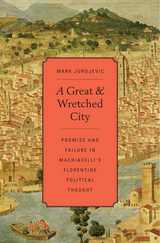
Like many inhabitants of booming metropolises, Machiavelli alternated between love and hate for his native city. He often wrote scathing remarks about Florentine political myopia, corruption, and servitude, but also wrote about Florence with pride, patriotism, and confident hope of better times. Despite the alternating tones of sarcasm and despair he used to describe Florentine affairs, Machiavelli provided a stubbornly persistent sense that his city had all the materials and potential necessary for a wholesale, triumphant, and epochal political renewal. As he memorably put it, Florence was "truly a great and wretched city."
Mark Jurdjevic focuses on the Florentine dimension of Machiavelli's political thought, revealing new aspects of his republican convictions. Through The Prince, Discourses, correspondence, and, most substantially, Florentine Histories, Jurdjevic examines Machiavelli's political career and relationships to the republic and the Medici. He shows that significant and as yet unrecognized aspects of Machiavelli's political thought were distinctly Florentine in inspiration, content, and purpose. From a new perspective and armed with new arguments, A Great and Wretched City reengages the venerable debate about Machiavelli's relationship to Renaissance republicanism. Dispelling the myth that Florentine politics offered Machiavelli only negative lessons, Jurdjevic argues that his contempt for the city's shortcomings was a direct function of his considerable estimation of its unrealized political potential.
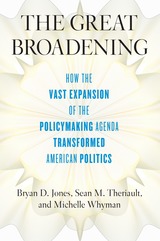
With The Great Broadening, Bryan D. Jones, Sean M. Theriault, and Michelle Whyman examine in detail the causes, internal dynamics, and consequences of this extended burst of activity. They argue that the broadening of government responsibilities into new policy areas such as health care, civil rights, and gender issues and the increasing depth of existing government programs explain many of the changes in America politics since the 1970s. Increasing government attention to particular issues was motivated by activist groups. In turn, the beneficiaries of the government policies that resulted became supporters of the government’s activity, leading to the broad acceptance of its role. This broadening and deepening of government, however, produced a reaction as groups critical of its activities organized to resist and roll back its growth.
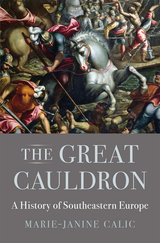
A sweeping history of southeastern Europe from antiquity to the present that reveals it to be a vibrant crossroads of trade, ideas, and religions.
We often think of the Balkans as a region beset by turmoil and backwardness, but from late antiquity to the present it has been a dynamic meeting place of cultures and religions. Combining deep insight with narrative flair, The Great Cauldron invites us to reconsider the history of this intriguing, diverse region as essential to the story of global Europe.
Marie-Janine Calic reveals the many ways in which southeastern Europe’s position at the crossroads of East and West shaped continental and global developments. The nascent merchant capitalism of the Mediterranean world helped the Balkan knights fight the Ottomans in the fifteenth century. The deep pull of nationalism led a young Serbian bookworm to spark the conflagration of World War I. The late twentieth century saw political Islam spread like wildfire in a region where Christians and Muslims had long lived side by side. Along with vivid snapshots of revealing moments in time, including Krujë in 1450 and Sarajevo in 1984, Calic introduces fascinating figures rarely found in standard European histories. We meet the Greek merchant and poet Rhigas Velestinlis, whose revolutionary pamphlet called for a general uprising against Ottoman tyranny in 1797. And the Croatian bishop Ivan Dominik Stratiko, who argued passionately for equality of the sexes and whose success with women astonished even his friend Casanova.
Calic’s ambitious reappraisal expands and deepens our understanding of the ever-changing mixture of peoples, faiths, and civilizations in this much-neglected nexus of empire.
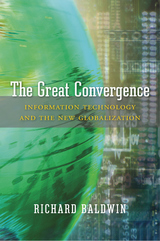
An Economist Best Book of the Year
A Financial Times Best Economics Book of the Year
A Fast Company “7 Books Microsoft CEO Satya Nadella Says You Need to Lead Smarter”
Between 1820 and 1990, the share of world income going to today’s wealthy nations soared from twenty percent to almost seventy. Since then, that share has plummeted to where it was in 1900. As the renowned economist Richard Baldwin reveals, this reversal of fortune reflects a new age of globalization that is drastically different from the old. The nature of globalization has changed, but our thinking about it has not.
Baldwin argues that the New Globalization is driven by knowledge crossing borders, not just goods. That is why its impact is more sudden, more individual, more unpredictable, and more uncontrollable than before—which presents developed nations with unprecedented challenges as they struggle to maintain reliable growth and social cohesion. It is the driving force behind what Baldwin calls “The Great Convergence,” as Asian economies catch up with the West.
“In this brilliant book, Baldwin has succeeded in saying something both new and true about globalization.”
—Martin Wolf, Financial Times
“A very powerful description of the newest phase of globalization.”
—Larry Summers, former U.S. Secretary of the Treasury
“An essential book for understanding how modern trade works via global supply chains. An antidote to the protectionist nonsense being peddled by some politicians today.”
—The Economist
“[An] indispensable guide to understanding how globalization has got us here and where it is likely to take us next.”
—Alan Beattie, Financial Times


The extreme nature of today’s climate events, Ghosh asserts, make them peculiarly resistant to contemporary modes of thinking and imagining. This is particularly true of serious literary fiction: hundred-year storms and freakish tornadoes simply feel too improbable for the novel; they are automatically consigned to other genres. In the writing of history, too, the climate crisis has sometimes led to gross simplifications; Ghosh shows that the history of the carbon economy is a tangled global story with many contradictory and counterintuitive elements.
Ghosh ends by suggesting that politics, much like literature, has become a matter of personal moral reckoning rather than an arena of collective action. But to limit fiction and politics to individual moral adventure comes at a great cost. The climate crisis asks us to imagine other forms of human existence—a task to which fiction, Ghosh argues, is the best suited of all cultural forms. His book serves as a great writer’s summons to confront the most urgent task of our time.
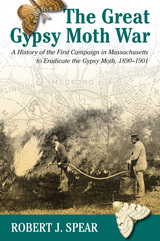
During the Civil War, when the supply of cotton from southern fields was disrupted, the owners of northern textile mills looked elsewhere for raw fiber. One source was silk. Among those experimenting with silkworm production was a Frenchman named Etienne Leopold Trouvelot, who had settled outside of Boston. It was Trouvelot who imported the gypsy moths and inadvertently allowed them to escape. Soon the invasion was on and a counteroffensive was required.
Spear reveals the turbulent undercurrents in the eradication campaign when the enthusiasm of the entomologists in charge turned into desperation upon the discovery that their alien adversary was much tougher than they thought. Fighting a war they could not win and dared not lose, the leaders of the campaign resorted to political maneuvering, cheap tricks, and outright misrepresentation to maintain a façade of success, urging the Commonwealth to continue funding the war long after any chance of victory had faded.
More than just reviewing the important events of this historic episode, Spear tells the story in an engaging way, often through the first-hand accounts of those who were directly involved. Much of what Spear has written is new, the recounting is lively, and the information he presents shows that almost all of the previous beliefs about the campaign to eradicate the gypsy moths are myths. In the process, he also traces the rise of modern economic entomology and the birth of the pesticide industry.
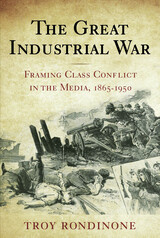
Examining how the mainstream press along with the writings of a select group of influential reformers and politicians framed strike news, Rondinone argues that the Civil War, coming on the cusp of a revolution in industrial productivity, offered a gruesome, indelible model for national conflict. He follows the heated discourse on class war through the nineteenth century until its general dissipation in the mid-twentieth century. Incorporating labor history, cultural studies, linguistic anthropology, and sociology, The Great Industrial War explores the influence of historical experience on popular perceptions of social order and class conflict and provides a reinterpretation of the origins and meaning of the Taft-Hartley Act and the industrial relations regime it supported.

To maintain thriving, sustainable fisheries in the Laurentian Great Lakes, an understanding of the numerous and complex ecological, societal, economic, management, and policy issues surrounding them is critical. This incisive study provides a collaborative, interjurisdictional, and multi-use perspective that is shaped by the United states and Canada together as part of their shared governance of these waters. This book offers an informed look at the Great Lakes fisheries and their ecosystems, as the contributors examine both the threats they have faced and the valuable opportunities they provide for basin citizens and industries. Divided into four sections—the Great Lakes region, Great Lakes Fisheries, Fisheries case studies, and outlook for the Future—this is a valuable and up-to-date tool for students, researchers, policymakers, and managers alike.

Journalist Peter Annin delves deeply into the fraught history of water use in the Great Lakes region and recaps the story of the Chicago River diversion, which reversed the flow of the river, fundamentally transforming the Great Lakes ecosystem. A century later it remains “the poster child of bad behavior in the Great Lakes.” Today, with growing communities and a warming climate, tensions over water use are high, and controversies on the perimeter of the Great Lakes Basin are on the rise. In this new and expanded edition of The Great Lakes Water Wars, Annin shares the stories of New Berlin and Waukesha, two Wisconsin communities straddling the Basin boundary whose recent legal battles have tested the legislative strength of the newly signed Compact. Annin devotes a new chapter to the volatile issue of the invasive Asian carp—a voracious species that reproduces at a disturbing rate—which is transforming the ecology of the river as it makes its way through the Chicago River diversion and ever closer to Lake Michigan.
With three new chapters and significant revisions to existing chapters that bring the story up-to-date over the past decade, this is the definitive behind-the-scenes account of the people and stories behind hard-fought battles to protect this precious resource that makes the region so special for the millions who call it home.

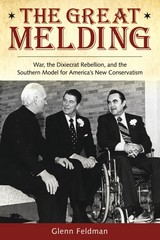
Audacious in its scope, subtle in its analysis, and persuasive in its arguments, The Great Melding is the second book in Glenn Feldman’s magisterial recounting of the South’s transformation from a Reconstruction-era citadel of Democratic Party inertia to a cauldron of GOP agitation. In this pioneering study, Feldman shows how the transitional years after World War II, the Dixiecrat episode, and the early 1950s formed a pivotal sequence of events that altered America’s political landscape in profound, fundamental, and unexpected ways.
Feldman’s landmark work The Irony of the Solid South dismantled the myth of the New Deal consensus, proving it to be only a fleeting alliance of fissiparous factions; The Great Melding further examines how the South broke away from that consensus. Exploring issues of race and white supremacy, Feldman documents and explains the roles of economics, religion, and emotive appeals to patriotism in southern voting patterns. His probing and original analysis includes a discussion of the limits of southern liberalism and a fresh examination of the Dixiecrat Revolt of 1948.
Feldman convincingly argues that the Dixiecrats—often dismissed as a transitory footnote in American politics—served as a template for the modern conservative movement. Now a predictable Republican stronghold, Alabama at the time was viewed by national political strategists as a battleground and bellwether. Masterfully synthesizing a vast range of sources, Feldman shows that Alabama was then one of the few states where voters made unpredictable choices between the competing ideologies of the Democrats, Republicans, and Dixiecrats.
Writing in his lively and provocative style, Feldman demonstrates that the events he recounts in Alabama between 1942 and Dwight Eisenhower’s 1952 election encapsulate a rare moment of fluidity in American politics, one in which the New Deal consensus shattered and the Democratic and Republican parties fought off a third-party revolt only to find themselves irrevocably altered by their success. The Great Melding will fascinate historians, political scientists, political strategists, and readers of political nonfiction.
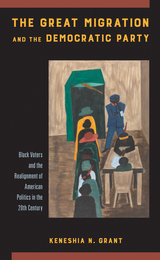
Where Black people live has long been an important determinant of their ability to participate in political processes. The Great Migration significantly changed the way Democratic Party elites interacted with Black communities in northern cities, Detroit, New York, and Chicago. Many white Democratic politicians came to believe the growing pool of Black voters could help them reach their electoral goals—and these politicians often changed their campaign strategies and positions to secure Black support. Furthermore, Black migrants were able to participate in politics because there were fewer barriers to Black political participations outside the South.
The Great Migration and the Democratic Party frames the Great Migration as an important economic and social event that also had serious political consequences. Keneshia Grant created one of the first listings of Black elected officials that classifies them based on their status as participants in the Great Migration. She also describes some of the policy/political concerns of the migrants. The Great Migration and the Democratic Party lays the groundwork for ways of thinking about the contemporary impact of Black migration on American politics.
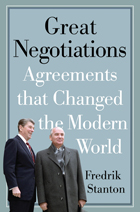
Lessons in Diplomacy from Colonial America to the Cold War
"In a time when negotiations, both great and small, continue to shape our world, this book provides an excellent opportunity to learn from the past and understand the present.”—Kofi Annan, Nobel Peace Prize Winner and former Secretary General of the United Nations
“A thought-provoking, informative book, highly recommended for all readers interested in international affairs.”—Library Journal
“For anyone with an interest in diplomacy and political history, Stanton's book is both entertaining and informative.” —Foreign Policy Watch
“Every professional concerned with dispute resolution and every student of negotiation has much to learn from Fredrik Stanton's lively stories of eight history-shaping negotiations.”—Robert H. Mnookin, Chair Program on Negotiation, Harvard Law School
“An excellent introduction into some of the great triumphs and failures of modern diplomacy.”—Seattle Post-Intelligencer
“An interesting, informative study well worth reading and pondering.” —American Diplomacy
“Stanton deftly illustrates that the power of haggling can easily rival that of any army or warhead.”—Roll Call
“Exhaustive research and careful thought have enabled Stanton to employ an extraordinary writing talent to produce a contribution to history and a source of enjoyable reading.”—New York Law Journal
“Stanton brings back to life both famous and some long forgotten personalities in the history of major American, European, and Asian negotiations. He persuasively makes his case for the importance of negotiators and negotiations both when wars can be kept from beginning and when wars end. He weaves in deft descriptions of the personal strengths and foibles of negotiators and homes in on the ability of the best to improvise when maneuvering on unfamiliar terrain.” —Ambassador Richard W. Murphy, Council on Foreign Relations
Words as much as weapons have shaped the course of history. Whether to avert, resolve, assist, or secure the outcome of a conflict, diplomacy in the modern age has had great triumphs and bitter failures, from the Cuban Missile Crisis in 1962, which narrowly spared humanity from a nuclear Armageddon, to the Treaty of Versailles after World War I, which created problems that still confront us today. Drawing on primary sources, transcripts, and interviews, Great Negotiations: Agreements that Changed the Modern World tells the stories of eight key episodes in modern diplomacy. From Benjamin Franklin securing crucial French support for the American revolution to Reagan and Gorbachev laying the groundwork to eliminate an entire class of nuclear weapons, Fredrik Stanton explains what each party brought to the negotiating table, the stakes, the obstacles to success, and how they were overcome.
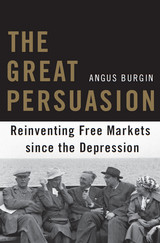
Just as today's observers struggle to justify the workings of the free market in the wake of a global economic crisis, an earlier generation of economists revisited their worldviews following the Great Depression. The Great Persuasionis an intellectual history of that project. Angus Burgin traces the evolution of postwar economic thought in order to reconsider many of the most basic assumptions of our market-centered world.
Conservatives often point to Friedrich Hayek as the most influential defender of the free market. By examining the work of such organizations as the Mont Pèlerin Society, an international association founded by Hayek in 1947 and later led by Milton Friedman, Burgin reveals that Hayek and his colleagues were deeply conflicted about many of the enduring problems of capitalism. Far from adopting an uncompromising stance against the interventionist state, they developed a social philosophy that admitted significant constraints on the market. Postwar conservative thought was more dynamic and cosmopolitan than has previously been understood.
It was only in the 1960s and '70s that Friedman and his contemporaries developed a more strident defense of the unfettered market. Their arguments provided a rhetorical foundation for the resurgent conservatism of Barry Goldwater and Ronald Reagan and inspired much of the political and economic agenda of the United States in the ensuing decades. Burgin's brilliant inquiry uncovers both the origins of the contemporary enthusiasm for the free market and the moral quandaries it has left behind.
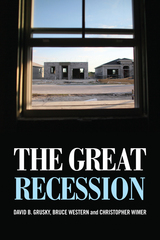
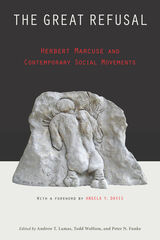
Herbert Marcuse examined the subjective and material conditions of radical social change and developed the "Great Refusal," a radical concept of "the protest against that which is." The editors and contributors to the exciting new volume The Great Refusal provide an analysis of contemporary social movements around the world with particular reference to Marcuse's revolutionary concept. The book also engages-and puts Marcuse in critical dialogue with-major theorists including Slavoj Žižek and Michel Foucault, among others.
The chapters in this book analyze different elements and locations of the contemporary wave of struggle, drawing on the work and vision of Marcuse in order to reveal, with a historical perspective, the present moment of resistance. Essays seek to understand recent uprisings-such as the Zapatistas in Mexico, the Arab Spring, and the Occupy movement-in the context of Marcuse's powerful conceptual apparatus.
The Great Refusal also charts contemporary social movements against global warming, mass incarceration, police brutality, white supremacy, militarization, technological development, and more, to provide insights that advance our understanding of resistance today.
Contributors include: Kevin B. Anderson, Stanley Aronowitz, Joan Braune, Jenny Chan, Angela Y. Davis, Arnold L. Farr, Andrew Feenberg, Michael Forman, Christian Fuchs, Stefan Gandler, Christian Garland, Toorjo Ghose, Imaculada Kangussu, George Katsiaficas, Douglas Kellner, Sarah Lynn Kleeb, Filip Kovacevic, Lauren Langman, Heather Love, Peter Marcuse, Martin J. Beck Matuštík, Russell Rockwell, AK Thompson, Marcelo Vieta, and the editors.
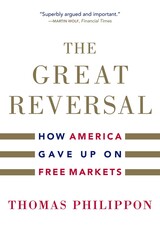
A Financial Times Book of the Year
A ProMarket Book of the Year
“Superbly argued and important…Donald Trump is in so many ways a product of the defective capitalism described in The Great Reversal. What the U.S. needs, instead, is another Teddy Roosevelt and his energetic trust-busting. Is that still imaginable? All believers in the virtues of competitive capitalism must hope so.”
—Martin Wolf, Financial Times
“In one industry after another…a few companies have grown so large that they have the power to keep prices high and wages low. It’s great for those corporations—and bad for almost everyone else.”
—David Leonhardt, New York Times
“Argues that the United States has much to gain by reforming how domestic markets work but also much to regain—a vitality that has been lost since the Reagan years…His analysis points to one way of making America great again: restoring our free-market competitiveness.”
—Arthur Herman, Wall Street Journal
Why are cell-phone plans so much more expensive in the United States than in Europe? It seems a simple question, but the search for an answer took one of the world’s leading economists on an unexpected journey through some of the most hotly debated issues in his field. He reached a surprising conclusion: American markets, once a model for the world, are giving up on healthy competition.
In the age of Silicon Valley start-ups and millennial millionaires, he hardly expected this. But the data from his cutting-edge research proved undeniable. In this compelling tale of economic detective work, we follow Thomas Philippon as he works out the facts and consequences of industry concentration, shows how lobbying and campaign contributions have defanged antitrust regulators, and considers what all this means. Philippon argues that many key problems of the American economy are due not to the flaws of capitalism or globalization but to the concentration of corporate power. By lobbying against competition, the biggest firms drive profits higher while depressing wages and limiting opportunities for investment, innovation, and growth. For the sake of ordinary Americans, he concludes, government needs to get back to what it once did best: keeping the playing field level for competition. It’s time to make American markets great—and free—again.
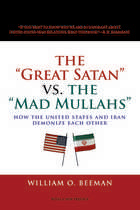
“William Beeman’s analysis of dissonant perceptions of Iran and the USA is compelling and important. . . . I am particularly grateful for this work.”—James Peacock, University of North Carolina at Chapel Hill
“[Beeman] is more interested in informing the reader than in impressing his peers. The other strength of the book lies in the author’s knowledge of Iranian history and culture. . . . It challenges the reader and forces him to question stereotypes about Iran and Washington’s perspective on the country.”—Abbas William Samii, Middle East Journal


In this volume of original essays, a distinguished group of scholars and activists reassess the mixed legacy of this third major reform period of the last century. They examine not only the policies and programs that were part of LBJ's Great Society, but also the underlying ideological and political shifts that changed the nature of liberalism. Some of the essays focus on Lyndon Johnson himself and the institution of the modern presidency, others on specific reform measures, and still others on the impact of these initiatives in the decades that followed. Perspectives, methodologies, and conclusions differ, yet all of the contributors agree that the Great Society represented an important chapter in the story of the American republic and its ongoing struggle to reconcile the power of the state with the rights of individuals—a struggle that has continued into the twenty-first century.
In addition to the editors, contributors include Henry J. Abraham, Brian Balogh, Rosalyn Baxandall, Edward Berkowitz, Eileen Boris, Richard A. Cloward, Hugh Davis Graham, Hugh Heclo, Frederick Hess, William E. Leuchtenburg, Nelson Lichtenstein, Patrick McGuinn, Wilson Carey McWilliams, R. Shep Melnick, Frances Fox Piven, and David M. Shribman.

A spectacular example of collective protest, the Great Strike of 1877--actually a sequence of related actions--was America's first national strike and the first major strike against the railroad industry. In some places, non-railroad workers also abandoned city businesses, creating one of the nation's first general strikes. Mobilizing hundreds of thousands of workers, the Great Strikes of 1877 transformed the nation's political landscape, shifting the primary political focus from Reconstruction to labor, capital, and the changing role of the state.
Probing essays by distinguished historians explore the social, political, regional, and ethnic landscape of the Great Strikes of 1877: long-term effects on state militias and national guard units; ethnic and class characterization of strikers; pictorial representations of poor laborers in the press; organizational strategies employed by railroad workers; participation by blacks; violence against Chinese immigrants; and the developing tension between capitalism and racial equality in the United States.
Contributors: Joshua Brown, Steven J. Hoffman, Michael Kazin, David Miller, Richard Schneirov, David O. Stowell, and Shelton Stromquist.
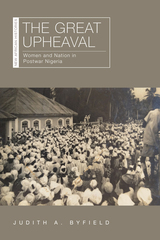

For poverty-stricken families in the Tennessee River Valley during the Great Depression, news of President Franklin D. Roosevelt’s New Deal plans to create the Tennessee Valley Authority—bringing the promise of jobs, soil conservation, and electricity—offered hope for a better life. The TVA dams would flood a considerable amount of land on the riverbanks, however, forcing many families to relocate. In exchange for this sacrifice for the “greater good,” these families were promised “fair market value” for their land. As the first geographic location to benefit from the electricity provided by TVA, the people of North Alabama had much to gain, but also much to lose.
In The Greater Good: Media, Family Removal, and TVA Dam Construction in North Alabama Laura Beth Daws and Susan L. Brinson describe the region’s preexisting conditions, analyze the effects of relocation, and argue that local newspapers had a significant impact in promoting the TVA’s agenda. The authors contend that it was principally through newspapers that local residents learned about the TVA and the process and reasons for relocation. Newspapers of the day encouraged regional cooperation by creating an overwhelmingly positive image of the TVA, emphasizing its economic benefits and disregarding many of the details of removal.
Using mostly primary research, the volume addresses two key questions: What happened to relocated families after they sacrificed their homes, lifestyles, and communities in the name of progress? And what role did mediated communication play in both the TVA’s family relocation process and the greater movement for the public to accept the TVA’s presence in their lives? The Greater Good offers a unique window into the larger impact of the New Deal in the South. Until now, most research on the TVA was focused on organizational development rather than on families, with little attention paid to the role of the media in garnering acceptance of a government-enforced relocation.
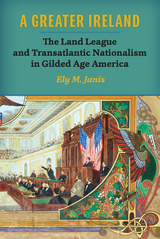
As this "Greater Ireland" flourished, new opportunities arose for women and working-class men to contribute within Irish-American society. Exploring the complex interplay of ethnicity, class, and gender, Janis demonstrates the broad range of ideological, social, and political opinion held by Irish Americans in the 1880s. Participation in the Land League deeply influenced a generation that replaced their old county and class allegiances with a common cause, shaping the future of Irish-American nationalism.
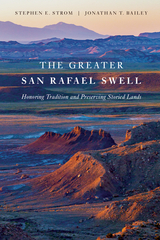
Natural and human history come together in The Greater San Rafael Swell, which spans much of Emery County in Utah. Authors Stephen Strom and Jonathan Bailey paint a multi-faceted picture of a singular place through photographs, along with descriptions of geology, paleontology, archaeology, history, and dozens of interviews with individuals who devoted more than two decades to developing a shared vision of the future of both the Swell and the County. At its core, the book relates the important story of how a coalition of ranchers, miners, off-road enthusiasts, conservationists, recreationists, and Native American tribal nations worked together for nearly 25 years to forge and pass the Emery County Public Lands Management Act in 2019.
This book chronicles hopeful stories for our times: how citizens of Emery and three other counties in the rural West worked to resolve perhaps the most volatile issue in the region – the future of public lands. Both their successes and the processes by which they found common ground serve as beacons in today’s uncertain landscape – beacons that can illuminate paths toward rebuilding our shared democracy from the ground up.

While fighting a war for the Union, the Republican party attempted to construct the world’s most powerful and most socially advanced nation. Rejecting the common assumption that wartime domestic legislation was a series of piecemeal reactions to wartime necessities, Heather Cox Richardson argues that party members systematically engineered pathbreaking laws to promote their distinctive theory of political economy.
Republicans were a dynamic, progressive party, the author shows, that championed a specific type of economic growth. They floated billions of dollars in bonds, developed a national currency and banking system, imposed income taxes and high tariffs, passed homestead legislation, launched the Union Pacific railroad, and eventually called for the end of slavery. Their aim was to encourage the economic success of individual Americans and to create a millennium for American farmers, laborers, and small capitalists.
However, Richardson demonstrates, while Republicans were trying to construct a nation of prosperous individuals, they were laying the foundation for rapid industrial expansion, corporate corruption, and popular protest. They created a newly active national government that they determined to use only to promote unregulated economic development. Unwittingly, they ushered in the Gilded Age.

At its inception in 1868, the modern Japanese state pursued policies and created institutions that lacked a coherent conception of religion. Yet the architects of the modern state pursued an explicit "religious settlement" as they set about designing a constitutional order through the 1880s. As a result, many of the cardinal institutions of the state, particularly the imperial institution, eventually were defined in opposition to religion.
Drawing on an assortment of primary sources, including internal government debates, diplomatic negotiations, and the popular press, Trent E. Maxey documents how the novel category of religion came to be seen as the "greatest problem" by the architects of the modern Japanese state. In Meiji Japan, religion designated a cognitive and social pluralism that resisted direct state control. It also provided the modern state with a means to contain, regulate, and neutralize that plurality.
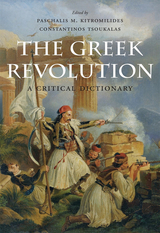
Winner of the 2022 London Hellenic Prize
On the bicentennial of the Greek Revolution, an essential guide to the momentous war for independence of the Greeks from the Ottoman Empire.
The Greek war for independence (1821–1830) often goes missing from discussion of the Age of Revolutions. Yet the rebellion against Ottoman rule was enormously influential in its time, and its resonances are felt across modern history. The Greeks inspired others to throw off the oppression that developed in the backlash to the French Revolution. And Europeans in general were hardly blind to the sight of Christian subjects toppling Muslim rulers. In this collection of essays, Paschalis Kitromilides and Constantinos Tsoukalas bring together scholars writing on the many facets of the Greek Revolution and placing it squarely within the revolutionary age.
An impressive roster of contributors traces the revolution as it unfolded and analyzes its regional and transnational repercussions, including the Romanian and Serbian revolts that spread the spirit of the Greek uprising through the Balkans. The essays also elucidate religious and cultural dimensions of Greek nationalism, including the power of the Orthodox church. One essay looks at the triumph of the idea of a Greek “homeland,” which bound the Greek diaspora—and its financial contributions—to the revolutionary cause. Another essay examines the Ottoman response, involving a series of reforms to the imperial military and allegiance system. Noted scholars cover major figures of the revolution; events as they were interpreted in the press, art, literature, and music; and the impact of intellectual movements such as philhellenism and the Enlightenment.
Authoritative and accessible, The Greek Revolution confirms the profound political significance and long-lasting cultural legacies of a pivotal event in world history.


At the center of what was once the tallgrass prairie, Iowa has stood out for clearing the land and becoming one of the most productive agricultural states in the nation. But its success is challenged by multiple issues including but not limited to a decline in union representation of meatpacking workers; lack of demographic diversity; the advent of job-replacing mechanization; growing income inequality; negative contributions to and effects of climate change and environmental hazards.
To become green, fair, and prosperous, Connerly argues that Iowa must reckon with its past and the fact that its farm economy continues to pollute waterways, while remaining utterly unprepared for climate change. Iowa must recognize ways in which it can bolster its residents’ standard of living and move away from its demographic tradition of whiteness. For development to be sustainable, society must balance it with environmental protection and social justice. Connerly provides a crucial roadmap for how Iowans can move forward and achieve this balance.

A visionary program for national renewal, the Green New Deal aims to protect the earth’s climate while creating good jobs, reducing injustice, and eliminating poverty. Its core principle is to use the necessity for climate protection as a basis for realizing full employment and social justice.
Jeremy Brecher goes beyond the national headlines and introduces readers to the community, municipal, county, state, tribal, and industry efforts advancing the Green New Deal across the United States. Brecher illustrates how such programs from below do the valuable work of building constituencies and providing proofs of concept for new ideas and initiatives. Block by block, these activities have come together to form a Green New Deal built on a strong foundation of small-scale movements and grassroots energy.
A call for hope and a better tomorrow, The Green New Deal from Below offers a blueprint for reconstructing society on new principles to avoid catastrophic climate change.

Environmental groups for the first time formalized their role in shaping U.S. and international trade policy during their involvement in NAFTA negotiations. John J. Audley identifies the political forces responsible for forging this new intersection of trade and environment policy during NAFTA negotiations, analyzes the achievements of the environmentalists, and explores their prospects for influencing future trade policy.
The need to reconcile the conflicting paradigms of economic expansion through free trade and that of limited sustainable development played a significant part in the political debate. Reluctant to acknowledge any relationship between these two principles, traditional trade policy actors were forced to include environmental interest groups in negotiations when the latter seriously threatened the treaty by aligning themselves with other anti-NAFTA interest groups, particularly labor. Other environmental groups worked with trade advocates to secure compromises in the agreement. The final bill included unprecedented environmental provisions, but not without serious infighting within the environmentalist community.
Drawing on his access to private as well as public documents exchanged among participants, Audley explores the interactions among the political actors. He explains how political compromises between environmental groups and trade policy elites came about, focusing in particular on the roles played by eleven national environmental organizations. In identifying their accomplishments, he concludes that although the environmentalists won some procedural changes, they failed to modify the norm of unfettered growth as the guiding principle of U.S. trade policy.
The first book to probe the role that environmental politics play in trade policy, this volume offers new insights into the political effectiveness of environmental organizations.
READERS
Browse our collection.
PUBLISHERS
See BiblioVault's publisher services.
STUDENT SERVICES
Files for college accessibility offices.
UChicago Accessibility Resources
home | accessibility | search | about | contact us
BiblioVault ® 2001 - 2024
The University of Chicago Press









